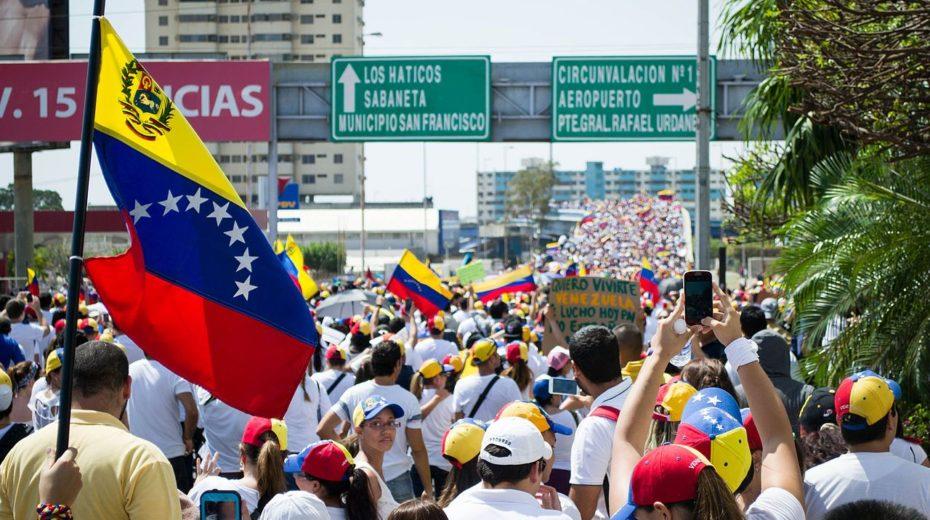Dead on Arrival – A Brief Post-Mortem on the US’ Regime-Change Operation in Venezuela
by Joaquin Flores, Strategic Culture:

They say hindsight is 20/20, and nothing exemplifies that more than the kind of post-mortem that can be done on the failed attempt by the US to overthrow the government of Venezuela. Working through the lack of options that the US has in terms of regime-change in Venezuela, should lead towards a higher degree of investor confidence in the Bolivarian Republic.
We understand that there are ultimately only three ways to attack a target state until it collapses:
- Supporting an internal coup/revolution or terrorism;
- Economic embargo perhaps leading to or justified by 1, and;
- Military invasion justified by the government’s reaction to 1
Then we can see that US has failed in the first two. While the US does appear on the rhetorical level to be willing to embargo the rest of planet earth, they would have to effectively do so in order to embargo Venezuela. By promoting globalization as a virtue, at the institutional level, and not simply recognizing it with problems and all as an inherent component of market economies, the US has withered its own ability to control other civilizations and states in the world’s growing multipolar system.
While the US can place sanctions on Venezuela, and get some countries to even go along with these sanctions, it only improves or strengthens the role and power of those middle-man countries like China which act as ‘value transactors’ of Venezuelan commodities into the global economy. Because it is impossible to ‘cut’ China out of the global economy, it is impossible to cut Venezuela out as well. Given how much China is invested into Venezuela’s economy, as the Wall Street Journal notes, there’s little chance that will change either.
Despite an effort to unseat the democratically elected PSUV government, we were offered some keen insights into the US’s own self-realization regarding their failed process, and publicly so by Pompeo himself.
The level of honesty coming from the Trump administration in the US is refreshing even as it is only half the truth. When we read that Pompeo has explained that the Venezuelan opposition is ‘divided’, this is of course nothing other than good news for those concerned with regional stability, economic development, and a de-escalation of tensions that can lead towards war and instability.
It is also tremendously true, even if Pompeo doesn’t really explain why it’s the case, at least not entirely. But the facticity of the claim in itself reveals that there can be no US sponsored ‘internal regime change’ in Venezuela. Both the governments of Brazil and Colombia – close US allies under their present administrations – have ruled out any sort of military intervention into Venezuela.
Pompeo’s Confession
In comments published by the Washington Post, from an audio recording, it was reported then that Pompeo admitted that:
“We were trying to support various religious institutions so that the opposition would unite,” Pompeo remarked, going on to explain that “they [the opposition] remain divided on how to confront the Maduro regime.”
This admission came on the heels of the recorded statement to the WP, where he previously explained:
“Our dilemma, which is to keep the (Venezuelan) opposition together, has turned out to be tremendously difficult,”
He continued, saying that:
“At the moment when (Nicolás) Maduro leaves, everyone will raise their hands and say: ‘Choose me, I’m the next president of Venezuela.’”
Subsequent to that comment, he would explain that an excess of 40 different Venezuelan opposition politicians have come forward expressing their view that as Guaido is but a transitional figure, that they ought to be ‘selected’ by the US to win an actual (i.e. staged) election. This would be, ideally for them, an election that comes on the heels of an absolute restructuring of the security apparatus of Venezuela. The idea would be to ensure the marginalization of the PSUV forces from the electoral process, a ‘counter-revolution’ of sorts. The staged elections involving various opposition parties and leaders would be an afterthought in all reality. And still, there is no consensus among this opposition on who should lead. Pompeo would continue to explain:
“Our dilemma, which is to keep the (Venezuelan) opposition together, has turned out to be extremely difficult […] The moment Maduro leaves, everybody’s going to raise their hands , ‘Take me, I’m the next president of Venezuela.’”
Pompeo expressed tremendous exasperation with this state of affairs, commenting that his realization of the problem isn’t one that came about recently, but is one in fact he was aware of since he began his work in the Trump administration with the CIA. To that point he stressed that these are problems which not only manifested themselves in “public during these last months, but since the day I became director of the CIA (Central Intelligence Agency), this was something that He was at the center of what President Trump was trying to do. ”
That’s to say, Pompeo understood this problem all along. The whole project was dead on arrival.
There is no military option
Given that Venezuela can’t really be effectively more embargoed than it presently is, the US is left with one option remaining. Yes, that leaves military options, nominally on the table in terms of US pressure tactics and techniques. But the reality is that these are something much less tangible than the US has historically relied upon. A lot of this has to do with the general decline of the US military in comparative terms. While the US maintains something approximating its military capacity in absolute terms, compared to a decade or two ago, it has not managed to maintain that in relative or comparative terms. The ‘gap’ between the U.S and other rising powers, military speaking – and this reflects economic changes as well – has become smaller. Even the Washington Post, as well as other mainstream US billionaire blogs, has admitted as much.
The fact of Venezuela’s anti-air capabilities in the form of the S-300 system are enough to bring unacceptable levels of material and human loss to the US air forces (Navy/Marine, Army, etc.). These could potentially bring the number of downed US fighters to many dozens in the first hours, of the first sortie. The loss of prestige alongside the scores of Cindy Sheehans this would produce, makes the venture a non-starter from go.
Read More @ Strategic-Culture.org
Loading...



